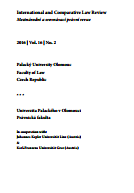Politically Palatable Parity: What the United States Can Learn From France in Achieving a More Representative Democracy
Politically Palatable Parity: What the United States Can Learn From France in Achieving a More Representative Democracy
Author(s): Nicholas J. D’AngeloSubject(s): Politics, Gender Studies, Government/Political systems
Published by: Univerzita Palackého v Olomouci_1
Keywords: parity; France; equal representation; representative government; laicite; feminism; female representation in government; equal rights;
Summary/Abstract: The United States considers itself a world superpower in many realms, but equality in political representation is not one of them. Currently, female representation in the United States Congress hovers around nineteen-percent, placing the United States in league with nations that have historically oppressed women, including Kenya and Tajikistan. While other, more infant, democracies have utilized political quotas as a means to increase female political involvement, the United States’ maintains a tradition of formal equality and neutralism. Long-standing precedent remains suspicious of anything resembling a quota. However, France faced a similar dilemma, unable to increase female representation due to a tradition of universalism. Working within its constitutional confines, France adopted parity in an attempt to achieve “perfect equality.” This paper argues that the United States may be able to use France as an example, thus potentially increasing female representation through a parity system that respects the traditions of our Constitution.
Journal: International and Comparative Law Review
- Issue Year: 16/2016
- Issue No: 2
- Page Range: 29-47
- Page Count: 19
- Language: English

